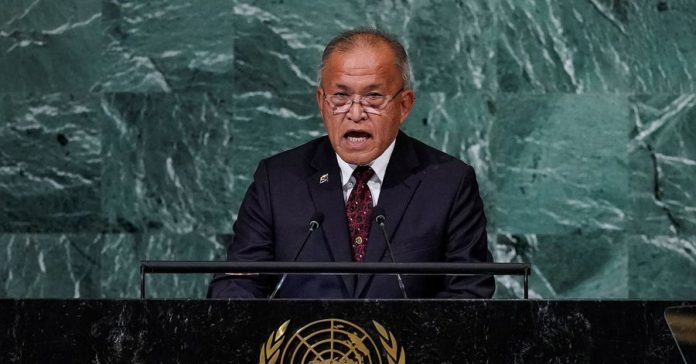The president of the Marshall Islands on Tuesday welcomed what he called progress towards a new association agreement with the United States, but said it is vital to better address the legacy of U.S nuclear testing and climate change.
David Kabua made the remarks at the annual United Nations General Assembly in New York, where he also appealed more broadly for help and action to address climate change, to which his low-lying Pacific island nation is especially vulnerable.
The Marshall Islands and other Pacific island states, the Federated States of Micronesia (FSM) and Palau, signed agreements known as compacts with the United States in the late 1980s that give the U.S defence responsibility and the right to military bases in return for economic support.
The compacts, which expire in 2023, and in 2024 in the case of Palau, are being renegotiated, and experts and former U.S officials warn the states could look to Washington’s geostrategic rival China for support should the talks fail.
“While we have shared goals and a strong partnership with the United States of America, we also have grave development challenges and essential needs,” Kabua said.
“We welcome recent progress with the United States of America towards a renewed Compact of Free Association and with it a targeted trust fund, he said.
However, he added: “It is vital that the legacy and contemporary challenges of nuclear impact testing be better addressed, that climate change be addressed with the urgency and commitment it deserves, and that our voice as an equal partner is strengthened.”
Kabua said Washington was emphasising its renewed engagement with the Pacific islands and added: “It is essential for all of us to ensure that words are met with action.”
The Marshall Islands comprises about 30 far-flung tropical atolls between Australia and Hawaii. Their average elevation is roughly two meters (6.5 ft) above sea level and tidal waves flood the land regularly with increasing ferocity.
Islanders are also still plagued by health and environmental effects of the 67 U.S nuclear tests conducted from 1946 to 1958, including “Castle Bravo” at Bikini Atoll in 1954 – the largest U.S bomb ever detonated.
Kabua was pointedly critical of China, highlighting human rights issues in its Xinjiang region and its military pressure on self-ruled, Chinese-claimed Taiwan, while calling on the United Nations “to better welcome Taiwan, and its people into our global family.”
U.S Secretary of State Antony Blinken is to host a meeting on Thursday on the sidelines of UNGA aimed at better coordinating assistance to the Pacific island region in the face of Chinese competition.
SOURCE: REUTERS/PACNEWS













